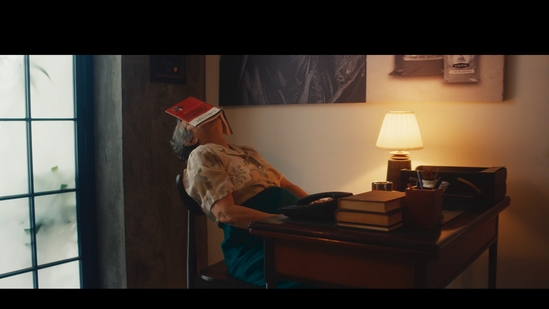Short Stream | Zoya: A silent rebellion wrapped in a tragic love story
Sayantan Mukherjee’s ‘Zoya’ is a visually rich film about class, love, and tragic alienation, with actor Nitanshi Goel of ‘Laapata Ladies’ fame in the lead
The peaceful co-existence of contrasting human experiences and identities can be a myth. At least in the inner chambers of our emotional life. In his debut film Zoya — produced by Chirag F. Patel and Ritika Kapoor — director Sayantan Mukherjee crafts a sparse, suspenseful and visually eloquent narrative around this powerful idea.

A “tragedy” is how the director describes it. Zoya is also a romance, a tragic love story against the grain of Bollywood masala. Nitanshi Goel, who played the memorable Phool in Kiran Rao’s Laapata Ladies, plays the eponymous protagonist in Zoya. With minimum dialogues and an exaggerated aural and visual scheme — it also helps that Goel has the most articulate pair of eyes an actor could be gifted with — the film becomes a nuanced examination of what it means to be different or bereft of privilege in a heavily patriarchal, success-driven world of a corporate office. You could be an integral cog in the wheel of this office machinery, and yet you are the outsider.
Zoya is an office assistant with a family-run company of the Awasthis. She serves coffee every day, several times, to every hustler at the company’s board room and cubicles. Aniket (Arjan Aujla), somewhat of a blue-eyed boy at the company destined to make it big by marrying into the family, has Zoya’s silent admiration. She knows exactly how he likes his coffee. She has a wide-eyed wonder about this world and about Aniket. Mukherjee says, “The exaggerations in the treatment are meant to articulate a sense of something looming, something new that Zoya is expecting or experiencing. My template was Alice in Wonderland. She fits into the dynamics of her role, she is curious and excited within her, she maintains a placid facade, and yet she is an outsider.” The co-existence of the privileged and the unprivileged, staff and executive, uniform and no-uniform, is overtly seamless but very palpable in Zoya’s interiority. Mukherjee’s — and screenplay writer Kshitij Bhatt’s — triumphs are in creating a convincing narrative around that interiority. The music by Sagar Kapoor, with an original song accentuating Zoya’s tussle between quiet longing and subtle rebellion, between fantasy and reality, is an effective propeller in the film.
Mukherjee, 31, is from Haldia, West Bengal. While growing up, he would travel three hours to a cinema theatre to watch Hindi films. The movie bug bit him early on. “After cable TV came, I watched Hindi movies obsessively,” he says. After a 5-year degree in animation at St Xavier’s College, Kolkata, which, he says, “made me more and more interested in real life narratives with people and cameras”, Mukherjee arrived in Mumbai in 2014, and worked at Viacom 18 for several years, where he assisted in film production and direction, and two years ago, started working on the story that Mumbai’s film production company offices triggered. “Different people from different social backgrounds working in one space with the common goal of making the office run smoothly is something that I have thought about a lot. The person who serves you the tea or coffee knows some basic things about you, like how you like your coffee or how much sugar is enough sugar for one person,” Mukherjee says. “I find a kiddish innocence in this, and I wanted Zoya the character to embody that.” He says the fact that the Mumbai film industry puts an aspiring filmmaker in a state of constant hope and challenge makes him thrive here: “Struggle makes me thrive, I am one of those.”
Completed late last year, Zoya has been a part of the Smita Patil International Film Festival in Pune so far and has been screened in a few venues in Mumbai. Its promise to reach cinema audiences far and wide is inevitable.
Short Stream is a monthly curated section in which we present an Indian short film that hasn’t been seen before or has not been widely seen before but is making the right buzz in the film industry and film festival circles. We stream the film for a month on HT Premium, the subscription-only section in hindustantimes.com.
Sanjukta Sharma is a Mumbai-based writer and film critic. Write to her at sanjukta.sharma@gmail.com.
All Access.
One Subscription.
Get 360° coverage—from daily headlines
to 100 year archives.



HT App & Website







